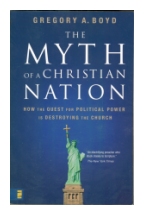|

|
|
Hardcover: 192 pages
Publisher: Zondervan (February 1, 2007)
Language: English
ISBN-10: 031027267X
ISBN-13: 9780310272670
|
Order from here:
|
|
|
| Please Note: I receive a small payment from Amazon for your purchase. |
| |
| |
|

|
|
Hardcover: 192 pages
Publisher: Zondervan (February 1, 2007)
Language: English
ISBN-10: 0310272661
ISBN-13: 978-0310272663
|
Order from here:
|
|
|
| |
| |
| |
I decided to go a different route with these two books. They were originally written as one book labeld Finding Faith. The author split them up, but I’ll review them both in one review. I purchased this book from a small overstock store. This isn’t so much on what to believe, but how, and how to determine for yourself what is real.
He starts the book with an Analogy of a man leaving his kingdom, for a place much better than where he lived. He walks for hours. Finally he tires, and falls asleep under a tree. He points his shoes to remind him of what direction to go in. In the middle of the night though, his shoes are moved. He awakens the next morning and continues his journey. Everyplace looks familiar and comfortable. The moral I got from it, is other lifes might look brighter and better, but the best life is the one where you feel at home, and everyone loves you.
He then starts to examine the different ways some people experience God. For some it’s being alone in Nature. Some experience God through Ritual, such as communion. Others, experience it through Obedience or self-denial. He uses the example of a co-worker propositioning you. By denying it, you bring yourself closer to God. God can also be experienced through worship and art. The final way is through the community. When everyone comes together to help a person out, or share a common goal, you can feel God around you. There are also other ways, which he goes into throughout the book.
A search for What Makes sense covers doubt, people having trouble getting into the bible, and the different ways people read the bible. There’s the Literal approach, and the Liberal approach. He doesn’t say which is right or wrong, but gives you the pro’s and con’s and discusses how both sides have their good aspects, but both tend to want to pull things out based on their own interpretations.
He also goes through different aspects, such as History in order to help you discover, or help you look further into discovering for yourself, what is real.
The second book, a Search for what makes sense has 2 parts. The first part is about Faith, Knowledge, and Doubt. He explains whether or not it matters what you believe, the relationship between faith and knowledge, and how a person can get deeper in their faith. The second part covers athiesm, why there are multiple religions, and whether all paths lead to the same god.
One section discusses bad faith versus good faith. Good faith among other things is humble. A person of good faith can learn from a child as well as their elders. Good faith allows a person to ask questions, and to question their religion. He used an example of a woman from a foreign country. He’d met her at a party and began a discussion on their different religions. As the conversation continued, he said, she became more agitated. Finally she told him that her religion didn’t permit her to question things, but his discussion was causing her to have questions. She abruptly ended the conversation.
In comparison is bad faith. Bad faith is accepting things because that’s what you’re told. I equate this to when you ask a question and someone says “because the bible says so”, or “because the Torah tells me that”, it can even lead into ministers. This kind of “blind” faith is bad, because, as we’ve seen from Jim Jones, it can lead people to do the wrong things for the wrong reasons. Bad faith is arrogant. A person showing bad faith is determined that only their view of things is the right view. I know I’ve been guilty of this plenty of times.
This book helped me see things from both sides of the equation. I could see where others were misled by their views, but I could also see where my own views exhibited bad faith. It really helped me understand that people in life, particular if they’re on a spiritual path, find themselves at different points on that path. We should help each other, regardless of background along that spiritual path. I really liked this book, and if you have the chance to read it, regardless of where you find yourself on that path, I think it will give you something to think about. Well worth the time to read it.
Each chapter of each book ends with discussion questions, resources, and a prayer to help you on that leg of discovery.
I really liked these books. The author doesn’t get overly preachy. He realizes that you might be on a different area of your spiritual journey, and doesn’t force. Unlike some Christian authors I’ve seen, he doesn’t tell you “This is the facts”, but rather presents his thoughts and views, and lets you find your own way. While these books probably wouldn’t appeal to long term believers, though I’d recommend them to anyone, as a good step for those who are curious, and willing to consider things.
Pick up either one, or both, if you get a chance. I think you’ll find something in them that will help you in your life, or something that you can pass on to others.
You can discuss it here






 Like
Like









